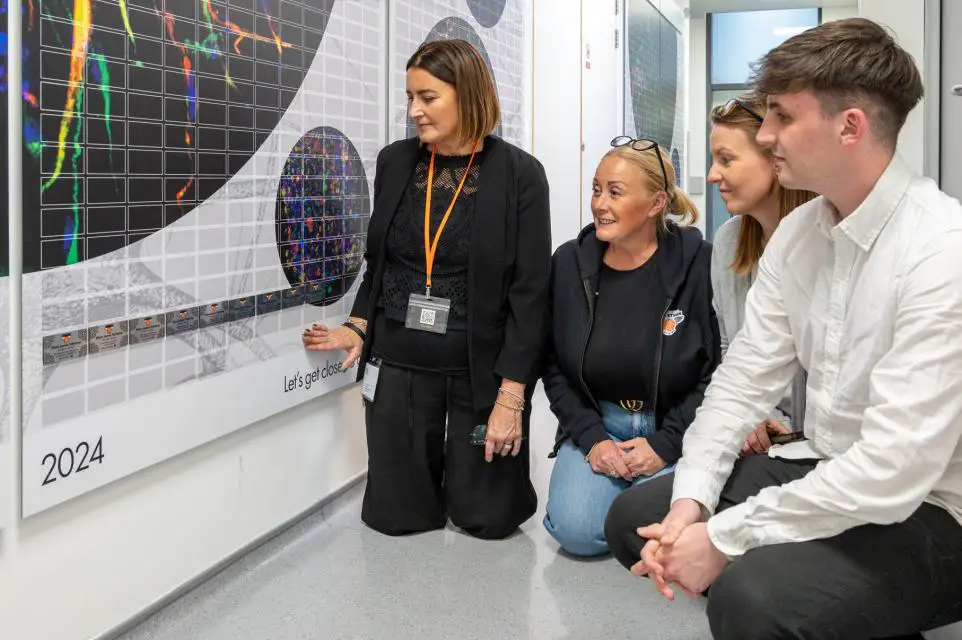From artisanal crepes to rebellious cheesecake waffles, Reading's breakfast rebels are transforming morning meals. These seven spots will revolutionize how you start your day.
In a poignant turn of events, the family of a Sandhurst teenager who lost their battle with a brain tumor has found a silver lining in their grief. A substantial £500,000 funding boost for a cancer research center has been warmly welcomed by the bereaved family, offering a glimmer of hope for future patients and their loved ones.
A Personal Connection to a Wider Cause
The story of this Sandhurst family's loss serves as a stark reminder of the devastating impact of brain tumors, particularly on young lives. Their embrace of this significant research funding underscores the critical importance of continued scientific exploration in the fight against this formidable disease.
A Beacon of Hope Amidst Loss
The family of a Sandhurst teenager who tragically lost their life to a brain tumor has found solace in a recent announcement of substantial funding for cancer research. A £500,000 boost has been granted to a cancer research center, igniting hope for future advancements in the fight against this devastating disease.
Nikki Treharne, the mother of the deceased teenager, along with her sister Kari Hunter and nephew Jacob Hill, recently visited the Institute of Cancer Research (ICR) to commemorate this significant development. In a touching gesture, they added pieces to the center's "wall of hope," symbolising their commitment to the cause and their desire to see progress in brain tumor research.
The Impact of Brain Tumors on Young Lives

The loss of a young life to a brain tumor serves as a stark reminder of the urgent need for continued research and improved treatments. Brain tumors can be particularly devastating when they affect children and teenagers, robbing them of their future and leaving families grappling with immense grief.
This substantial funding boost represents a crucial step forward in the ongoing battle against brain tumors. It provides researchers with additional resources to explore new avenues of treatment, potentially leading to breakthroughs that could save lives in the future.
The Role of Research Centers in Fighting Cancer
Cancer research centers like the ICR play a vital role in the development of new therapies and treatment approaches. These institutions bring together top scientists and medical professionals, fostering an environment of collaboration and innovation.
The £500,000 funding injection will likely support various aspects of brain tumor research, from basic science investigations to clinical trials. This comprehensive approach is essential in tackling the complex challenges posed by brain tumors, which often require multifaceted treatment strategies.
Community Support and Awareness
The Sandhurst family's public embrace of this research funding highlights the importance of community involvement in the fight against cancer. Their story serves as a powerful reminder of the human impact of brain tumors and the critical need for ongoing support for research initiatives.
By sharing their experience and actively participating in events at the ICR, the family is helping to raise awareness about brain tumors and the importance of continued scientific exploration. Their actions may inspire others to contribute to the cause, whether through fundraising efforts, volunteering, or participating in clinical trials.
Looking to the Future
While the loss of a loved one to a brain tumor is undoubtedly devastating, the family's involvement with the ICR and their support for this significant funding boost demonstrate a commitment to creating a better future for others facing similar diagnoses.
As research continues and new treatments emerge, there is hope that fewer families will have to endure the pain of losing a young person to a brain tumor. The £500,000 funding represents not just a financial investment, but an investment in hope, progress, and the possibility of lives saved in the years to come.
Empowering the Scientific Community
With this significant influx of resources, researchers at the Institute of Cancer Research (ICR) are better equipped to pursue innovative approaches to understanding and treating brain tumors. This funding may enable the exploration of cutting-edge technologies, such as personalised medicine or immunotherapy, which hold promise for more effective and less invasive treatments. By empowering scientists with the necessary tools and support, the chances of making meaningful progress in the fight against brain tumors are greatly enhanced.
A Legacy of Hope
The Sandhurst family's involvement with the ICR and their support for this research funding creates a lasting legacy for their loved one. By channeling their grief into positive action, they are helping to shape a future where brain tumors may no longer claim young lives prematurely. Their story serves as an inspiration to others affected by this devastating disease, showing how personal tragedy can be transformed into a force for positive change.
Strengthening the Research Ecosystem
This substantial funding boost not only benefits the ICR but also strengthens the entire brain tumor research ecosystem. It may attract more talented researchers to the field, foster collaborations between institutions, and potentially lead to additional funding opportunities in the future. By creating a ripple effect within the scientific community, this investment has the potential to accelerate progress on multiple fronts in the battle against brain tumors.
A Beacon for Future Generations
As research advances and new treatments emerge, the hope is that future generations will face a world where brain tumors are no longer a life-threatening diagnosis. The Sandhurst family's story and the significant funding boost serve as a beacon of hope, illuminating the path towards a future where young lives are no longer cut short by this devastating disease. Their journey from personal loss to advocacy for research funding embodies the resilience of the human spirit and the power of hope in the face of adversity.